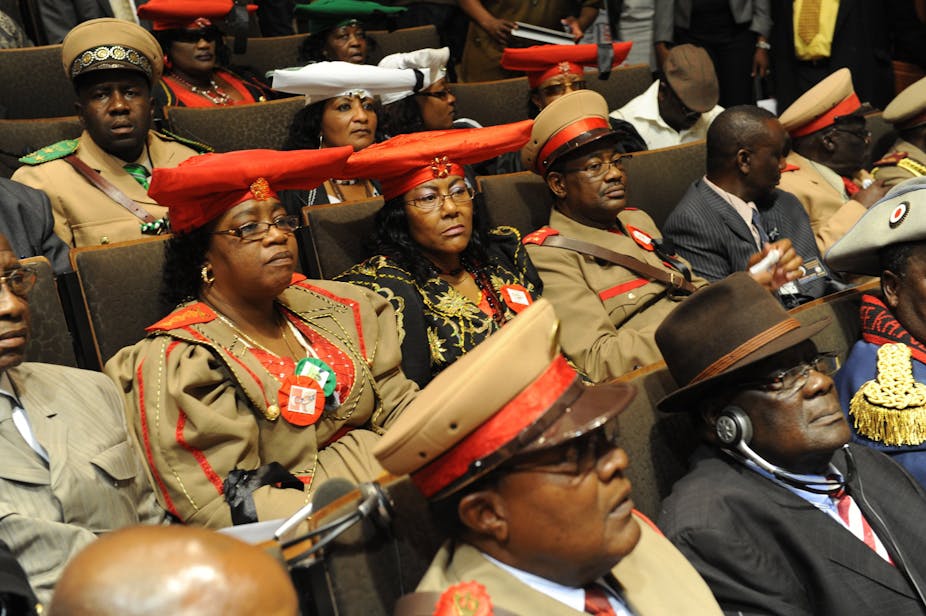Representatives of the communities directly affected by the 1904-1908 genocide in Namibia have taken the German government to court in New York. The plaintiffs are suing Germany for damages to be paid directly to the descendants of the Ovaherero and Nama genocide survivors.
In 1904 and 1905 the Ovaherero and Nama of central and southern Namibia rose up against colonial rule and dispossession in what was then called German South West Africa. The revolt was brutally crushed. By 1908 80% of the Ovaherero and 50% of the Nama had died of starvation and thirst, overwork and exposure to harsh climates. The army drove survivors into the waterless Omaheke desert. Thousands more died in concentration camps.
On 5 January 2017, Ovaherero Chief Vekuii Rukoro and head of the Nama traditional authorities David Fredericks filed a class action lawsuit in New York. They are invoking the Alien Tort Statute, a 1789 United States law often used in human rights cases. The case was brought to court in the US because it allows lawsuits that address claims on behalf of entire communities.
If the case succeeds it will be significant for claims from other genocides committed before the United Nations Convention on the Prevention and Punishment of the Crime of Genocide was passed. The convention came into force in 1951.
Acknowledgement
In July 2015 the German Foreign Ministry spokesperson admitted during a press conference that,
the war of extermination in Namibia from 1904 to 1908 was a war crime and a genocide.
This acknowledgement came a decade after an earlier ineffective attempt at an apology. In 2004 Heidemarie Wieczorek-Zeul, then Germany’s Minister of Development Cooperation, attended the Herero genocide centenary commemorations. During her speech she offered an ostensible apology but this was later retracted by the government in Berlin.
For the past year official Namibian and German envoys have been talking about the way ahead. The negotiations have been complicated and contested. Although Germany has officially acknowledged the genocide, a formal apology is still outstanding.
Most controversial is the issue of reparations. The plaintiffs in the US case are claiming reparations from the German government for the atrocities committed by Imperial Germany.
Reparations
Germany has ruled out direct reparations. It has made clear that it prefers payments to the Namibian government in the form of foreign aid.
Rukoro and Fredericks are seeking an order from the court requesting that, as the lawful representatives of the “peoples” directly affected, they be included in any negotiations and settlements between Germany and Namibia. This seems to be a critical issue. Ovaherero and Nama victim groups have objected to the fact that current talks between Germany and Namibia are taking place without delegates of their communities.
But Germany has insisted that it won’t negotiate with delegates of the Ovaherero and Nama. German envoys only talk to the central Namibian government. The Namibian government has also insisted that negotiations only be between the two governments.

In their joint statement, issued on January 5, the chiefs charged that the Namibian government could not adequately represent the interests of the Ovaherero and Nama as “indigenous and minority” communities. Their legal representative suggested that if reparations were paid in the form of foreign aid they might not reach the affected communities. In short, the Ovaherero and Nama leaders contend that in independent Namibia their people are marginalised.
“Not without us”
At issue is Namibia’s fragmented history. The country’s dominant narrative of anti-colonial struggles emphasises the role of the once exiled SWAPO and, to a lesser extent, the northern Namibian experience of the 1966-1989 liberation war against South Africa. Early resistance against German colonial rule in southern and central Namibia is afforded a negligible place in the country’s history.
Soon after independence in 1990 people in the southern and central regions of Namibia started complaining that development efforts mostly reached SWAPO’s heartland in the country’s north. Herero- and Nama-speakers contend that infrastructure is only developed in the regions dominated by the Owambo communities. SWAPO had its historical roots among Oshiwambo-speakers.
It took until 2015 for the first non-Owambo, Hage Geingob to take office as Namibian President.
Efforts have been made by Ovaherero and Nama to stake their rightful place in the country’s history of anti-colonial resistance. The German sociologist Reinhart Kössler conducted research on historical reenactments, commemorative reconstructions and performances in central and southern Namibia. In Namibia and Germany: Negotiating the Past he showed that these helped the communities assert their rightful place.
In recent months the genocide victim groups have become more vocal and persistent. They are demanding an inclusive process under the slogan “not without us”. In October 2016 an international civil society congress, “Restorative Justice after Genocide”, brought together over 50 Herero and Nama delegates and German solidarity activists in Berlin to discuss the way forward.
They held public protests and Herero and Nama delegates held a press conference in the German Bundestag.
Where to from here?
The lawsuit filed in New York sends a strong message to Germany and the Namibian government that negotiations “without us” remain unacceptable for those whose ancestors were killed in the genocide.
It’s not clear what the outcome will be.
The German government has said that the government to government negotiations will continue in their present format.
The plaintiffs, on the other hand, are optimistic that international human rights law will be on their side. If the case succeeds, other claims for genocide damages may follow, including some from indigenous communities in the US which were decimated during North American colonisation.

